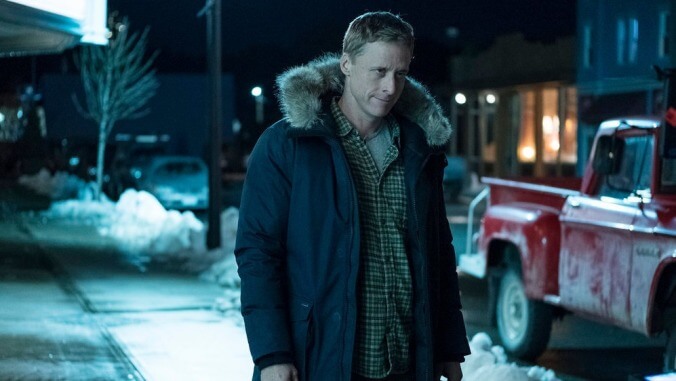Resident Alien can’t quite match Alan Tudyk’s winningly weird comic charms—yet


At the conclusion of the first episode of Resident Alien, the new Syfy dramedy starring Alan Tudyk, viewers could be forgiven for thinking they’re essentially watching an extremely high-concept version of Monk: There’s a murder mystery, an extremely awkward lead character asked to help solve the crime, and a parade of supporting townsfolk there to interact in humorously strange ways. But the show quickly reveals itself to be nothing of the sort, simultaneously far odder and more pedestrian than Tony Shalhoub’s police procedural; for one, there’s an intergalactic alien running around trying to find missing pieces of his ship, all while disguised as a small-town doctor. But whenever those alien shenanigans get put on hold, Resident Alien quickly pivots into a lukewarm primetime soap, like Everwood without the heartwarming twists on stock character types. And while there’s promise in both concepts, the early going is an unwieldy fusion of the two.
The success of this quirky little series rests almost wholly on Tudyk’s capable comic-actor shoulders. The premise sees his interstellar visitor crash-land on Earth after his ship is struck by lightning during a mission, at which point he makes his way to a remote cabin in the town of Patience, Colorado, where he murders the owner and transforms his alien physique into an exact replica of the human whose home he just invaded. Cut to four months later, when, after learning English via endless marathoning of Law & Order, the man he’s impersonating—Dr. Harry Vanderspeigle, a hotshot New York surgeon who was vacationing at his winter retreat when Tudyk’s alien murdered him—is recruited to take over temporarily when the longtime town doctor dies under mysterious circumstances. Harry (he adopts the dead man’s identity) soon learns that people aren’t as pointless as he had previously suspected, even as he searches for pieces of his ship to help him complete the aforementioned mission: the destruction of all human life.
From that outlandish beginning, the show mines fertile comic drama from Harry’s predicament—desperately trying to blend in and avoid suspicion while having almost no idea how to effectively portray an average Joe. Tudyk’s physical-comedy chops are put to excellent use, as Harry tries (and often fails) to perform the basic tasks of sociability, from laughing at a joke to responding appropriately to normal conversational etiquette. Luckily, he has an ally in the nurse at his new job, Asta Twelvetrees (Sara Tomko), who takes his behavior at face value, as a collection of tics from a well-meaning neuroatypical. “I’ve always been an outsider; maybe that’s why I understand you,” she says in a quick summation of the “look, just accept it” mentality the show adopts toward a lead character who in a more straightforward narrative would almost certainly be avoided like the plague. The rest of the town follows suit, accepting Harry’s idiosyncrasies as the odd behavior of a doctor with terrible people skills, who’s otherwise harmless.
For the most part, the steady progression of this narrative is a winning one; once you get over the fact that these people have welcomed with open arms a man who seems worryingly unstable (at times, Tudyk can go too broad), the story of Harry’s gradual understanding of human behavior—and the way it starts to affect his own alien attitudes and actions—is predictable but fun. From his improper response to seeing a bloody dead body (“This is awesome!”) to struggles with how to smile, Tudyk makes Harry a frank and funny narrator. After a local child, Max, is revealed to possess a genetic mutation that allows him to see through the alien’s human disguise, a trip to a local bar to try alcohol for the first time leads to the following thought process on Harry’s part: “It’s simple—I’ll just break into that kid’s house and kill him. I’ll say this about whiskey: It’s allowing me to make smart, rational decisions.” When the show takes this in too serious a direction, it quickly gets clumsily sentimental, but as a comic vehicle for Tudyk’s ample talents, it’s a winner.
Unfortunately, Resident Alien also wants to be an appealing small-town drama, and the results of shoehorning in such typical TV offerings are uneven at best. The second and third episodes try to shift focus from Harry to Asta and others with soap opera-level plot twists and emotional button-pushing it hasn’t earned (secret babies given up for adoption! Old friends rediscovering their friendship!), and which drag down the proceedings. Similarly, later episodes introduce characters from Harry’s past who should, frankly, know better than to think he’s the same guy, straining what little credulity the show grants its premise in the first place.
The supporting cast runs the gamut from excellent to disastrous. On the positive side, the show’s clear MVP (other than Tudyk) is Silicon Valley’s Alice Wetterlund, who takes the role of D’arcy, a former Olympian turned bartender with a tendency to make bad choices, and invests her with so much guile, charm, and quick-witted humor, she almost achieves the level of greatness Homer Simpson had hoped to find with Poochie. (“Whenever D’arcy’s not onscreen, all the other characters should be asking, ‘Where’s D’arcy?’”) On the negative side, poor Corey Reynolds is saddled with the role of Sheriff Mike Thompson, a character so riddled with outsized traits and affectations that he comes across as less believably human than the literal alien around which the show revolves. The intrusion of a more grounded drama into the large-than-life comic premise that drives the series doesn’t really succeed over the course of the season; the show has some work to do to balance its competing impulses.
That uneven hit-to-miss ratio means Resident Alien is only fitfully entertaining, at least for now. Whenever Tudyk or Wetterlund (or both, in the show’s best scenes) are onscreen, the show generally shines, remaining funny and engaging despite the odd stumble. But when attention shifts to the rest of the town of Patience, there’s simply not yet enough accumulated goodwill or interest in these people to sustain it. Still, the show often abandons those sudsy dramatics and lets its supporting cast play off one another—and Tudyk—in believable, grounded ways, managing to rise above its sometimes lackluster B-plots. If it can cast off the weaker narrative decisions and tighten up the non-Harry material, Resident Alien could be an alien adventure worth tagging along on.